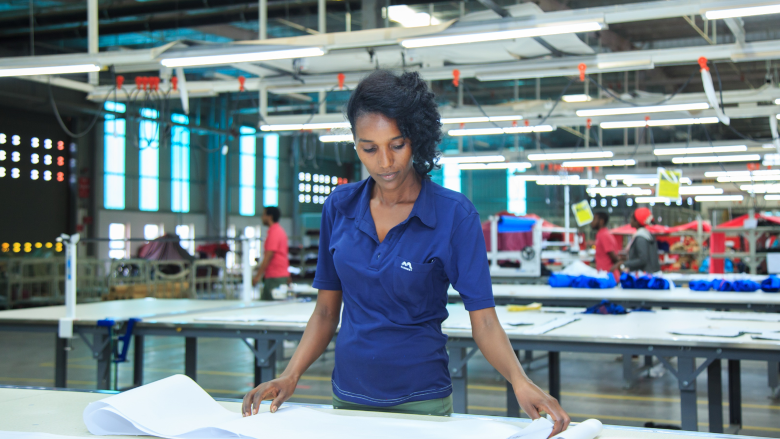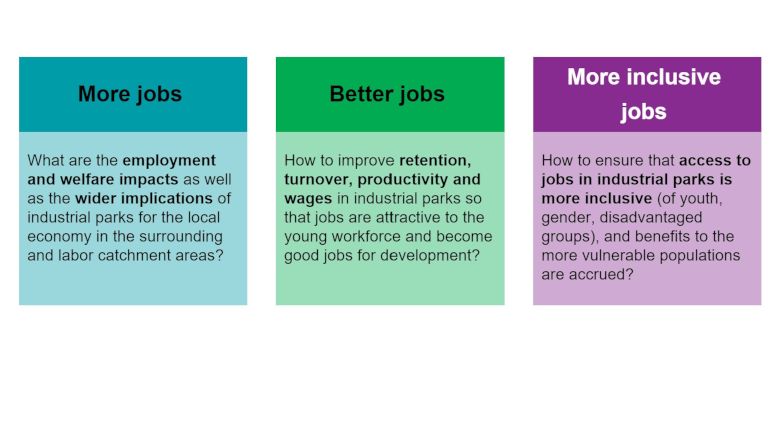Over the past years, the Government of Ethiopia (GoE) has set up several special economic zones – industrial parks – to encourage foreign direct investment into the manufacturing sector and thus promote exports and job creation. Experience of other countries has demonstrated that industrialization can play a significant role in the creation of more, better, and more inclusive jobs. Export-oriented industrialization and participation in global value chains (GVCs) in particular can lead to positive job outcomes.
While significant progress has been made in the establishment of industrial parks and attraction of international investors, the industrial parks continue to face a number of challenges.
The analytical work program on “More, better, and more inclusive jobs: Preparing for successful industrialization in Ethiopia” funded by the UK Foreign, Commonwealth & Development Office (FCDO) aims to provide rigorous evidence on how job outcomes in industrial parks can be improved (see Figure 1).
The Coronavirus disease 2019 (COVID-19) pandemic poses an unprecedented challenge for the Ethiopian economy and the country's ambitious industrialization agenda. In line with the broader impacts of COVID-19 on industries and value chains around the world, production in Ethiopia’s industrial parks has been heavily affected. While some firms have been able to repurpose their production towards personal protective equipment (PPE), many had to put their labor force on temporary paid or unpaid leave. The Government of Ethiopia reacted quickly by announcing a range of measures designed to help firms in the economy, including those in the industrial parks.
To provide GoE policy makers, development partners, private sector and other stakeholders with timely and relevant data, the work program shifted some of the research projects towards capturing the impact of COVID-19 on Ethiopia’s industrial parks, its firms, and its workers. This website reports findings from different surveys and research projects implemented as part of this work program.
COVID-19 Impact on Industrial Park Firms
Between May and August 2020, the work program together with a team of academic researchers has implemented a phone survey of industrial park firms. The survey assessed the effects of the pandemic on the firms’ sales and production, identifying the specific constraints that prevented firms from keeping their sales and production the same as planned.
The survey data suggests that over the past months, the pandemic has severely impacted firms’ ability to produce and sell their output. The availability and affordability of foreign inputs and the availability of labor are widely reported as constraints to production. Government support measures have not reached the majority of firms.
After these initial demand- and supply-side shocks, firms in industrial parks now appear to be entering a new uncertain phase: In the six months following the survey, firms expect that orders will decrease by an average of 20 percent and employment by 17 percent compared to the same period last year. These findings illustrate the need for sustained support to preserve the significant investments made in this sector.
Documents
COVID-19 Impact on Industrial Park Workers
In order to document how the lives of industrial park workers are impacted by the pandemic, a team of researchers led by Morgan Hardy (New York University Abu Dhabi) and Christian Johannes Meyer (University of Oxford) is deploying high-frequency phone surveys on a representative sample of about 4,000 garment factory workers in Hawassa Industrial Park (HIP).
The baseline survey documents significant changes in employment, high levels of migration away from urban areas to rural areas if women are no longer working, and high levels of food insecurity. Data collection and analysis is ongoing.
Documents
- Briefing note
- Article on first round results (forthcoming in World Development)
- Working paper on the impact of downsizing
- Survey instrument
- Survey design, sampling and study population

